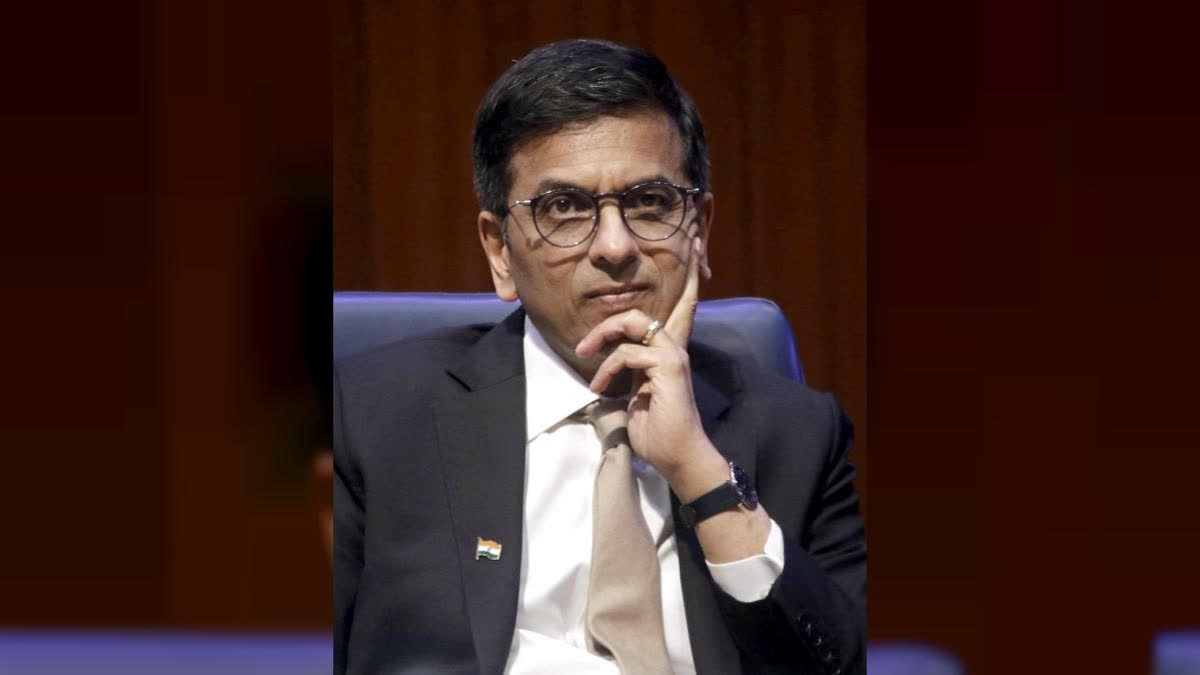New Delhi: The Chief Justice of India D Y Chandrachud on Saturday said the newly enacted criminal laws have transitioned India’s legal framework on criminal justice into a new age and India is set for a "significant overhaul" of its criminal justice system with the implementation of the criminal laws.
Hailing the enactment of the new criminal justice laws as a "watershed moment" for the society, the CJI said much needed improvements have been introduced to protect victim interests and carry out the investigation and prosecution of offences efficiently.
The new laws -- the Bharatiya Nyaya Sanhita, the Bharatiya Nagarik Suraksha Sanhita and the Bharatiya Sakshya Act -- to completely overhaul the country's criminal justice system will come into effect from July 1. However, the provision related to cases of hit-and-run by vehicle drivers would not be implemented immediately.
The CJI said said Bharatiya Nagarik Suraksha Sanhita (BNSS) encompasses a holistic approach to deal with crimes in the digital age. He said the laws must aim to give victims a sense of agency and control in the criminal process as well as a sense of justice. “I expect that with the implementation of the new criminal laws, we will discover loopholes and areas which need to be addressed”, he said.
The CJI said that our laws need to address age-old issues like delays in examination of witnesses, conclusion of trials, overcrowding of prisons, and the issue of undertrial prisoners.
“The BNSS encompasses a holistic approach to deal with crimes in the digital age. It prescribes audio visual recording of search and seizures and the presence of a forensic expert at the crime scene for offences punishable with more than seven years imprisonment”, he said, speaking at a conference in the capital on 'India's Progressive Path in the Administration of Criminal Justice System'.
He said that the audio-visual recording of search and seizures is an important tool for the prosecution as well as for protecting the civil liberties of citizens. The judicial scrutiny would safeguard the rights of citizens against procedural impropriety during search and seizures, added Justice Chandrachud.
However, the CJI stressed that while we make strides in this direction, “we must now confront the challenges of fulfilling the aims of the new criminal legislations”. He said detailed rules need to be formulated on the type of devices to be used for recording, incorporating the principles of natural justice and laying down the consequences of not carrying out such recording.
The CJI said it was therefore very heartening to note that Section 532 of the BNSS allows for all trials, inquiries, and proceedings under the code to be conducted electronically. “As laudable as this addition is, we must continuously introspect and protect the privacy of the accused as well as the victim when dealing with digitisation of proceedings and creating digital evidence. In the digital age, the data and sensitive information of person's has gained paramount importance”, said the CJI.
The CJI cautioned that the power which comes with personal data puts a corresponding duty on systems which are immune to penetration and leakage of the data. “In the courts, we confront the challenges of data leak every day. The safety of a person, the stigma attached to an accused, the threat perception of a witness will be compromised if the privacy of the stakeholders is not protected”, he said, adding that technology holds the key to a futuristic court system.
“While the new criminal laws create provisions which are synchronised to our times”, stressed the CJI, “we must also ensure that the infrastructure accompanying these procedures are developed adequately for the country to reap the benefits of the new law”.
Justice Chandrachud further emphasized on heavily investing in capacity building of our forensic experts, conducting training of investigating officers, and also investing in the court system.
The CJI said the BNSS provides that criminal trials must be completed in three years and that a judgment must be pronounced within 45 days of it being reserved. He added that this stipulation is a breath of fresh air for addressing the issue of case pendency as well as the rights of the victim and the accused in a criminal case. “However, if the court infrastructure and the prosecution lack material resources to harness technology and conduct an efficient and speedy trial then the guarantees of the BNSS may run the risk of becoming merely directory and unimplementable”, he said.
The CJI said the BNSS has made a positive development in protecting the fundamental rights of undertrial prisoners. Section 481 of the BNSS prescribes default bail for an accused person who has undergone one-third of the term of punishment for the offence charged against him, he added.
Union Law Minister Arjun Ram Meghwal, Attorney General R Venkataramani and Solicitor General Tushar Mehta were also present at the conference.
The newly enacted laws -- the Bharatiya Nyaya Sanhita, the Bharatiya Nagarik Suraksha Sanhita and the Bharatiya Sakshya Act -- to completely overhaul the country's criminal justice system will come into effect from July 1.
“These laws signify a watershed moment for our society because no law affects the day-to-day conduct of our society like the criminal law. Criminal law directs the moral arc of a nation and has the ability of depriving people of their cherished liberties”, said the CJI.
The CJI said summary trial has been made mandatory for petty and less serious offences and the magisterial system has also been streamlined, and further stressed that it is imperative to boost the infrastructure and capacity of our police forces.
Read More



